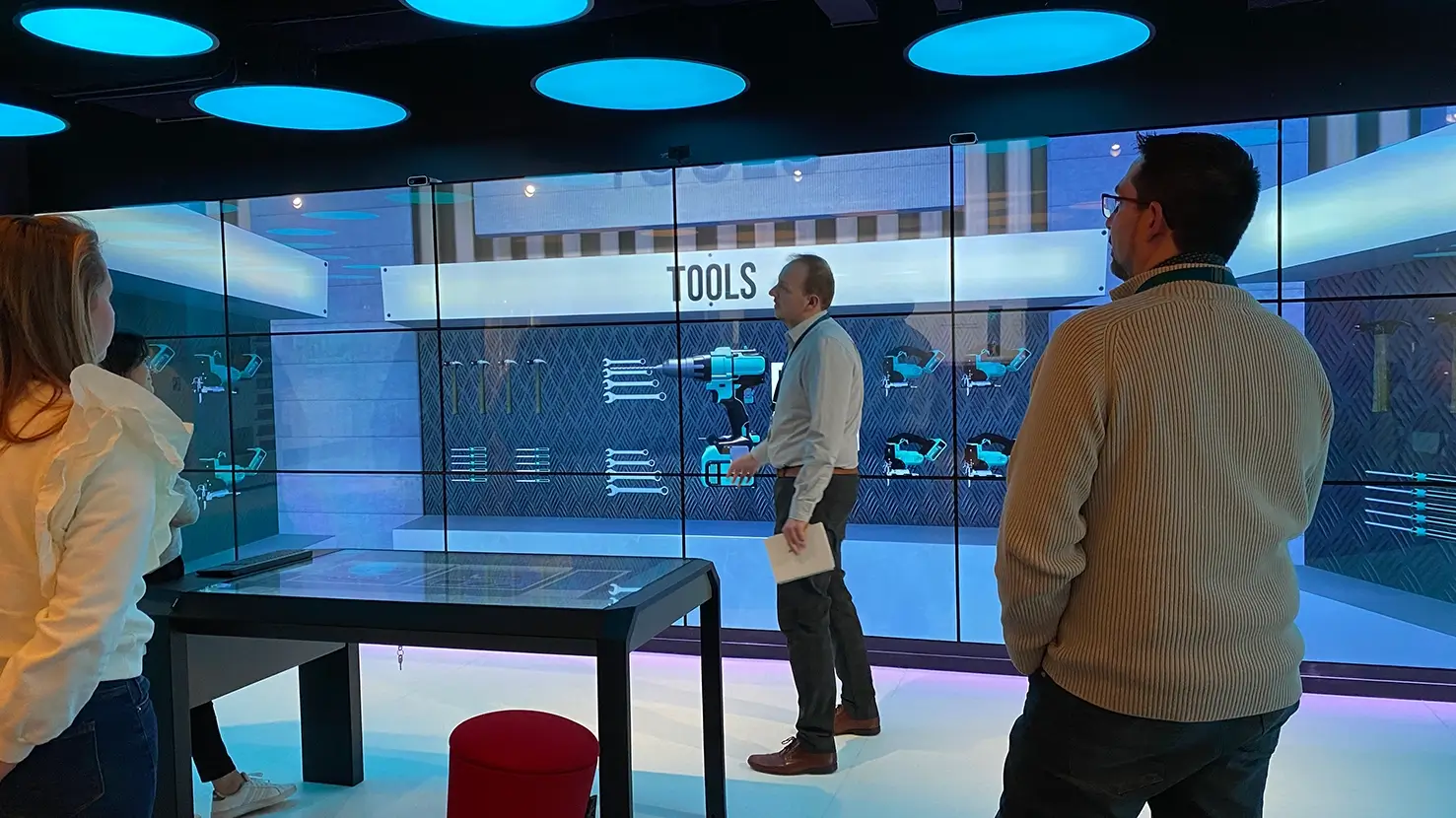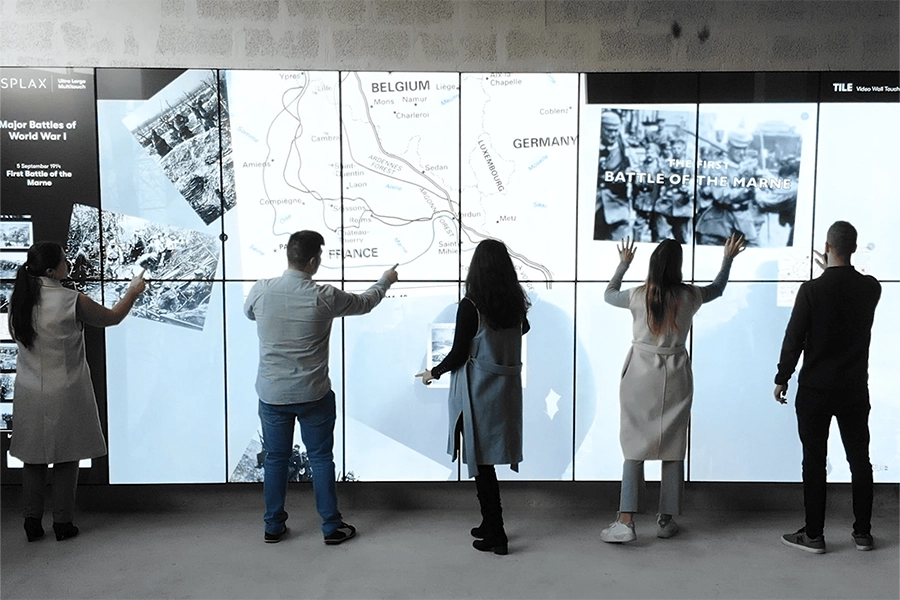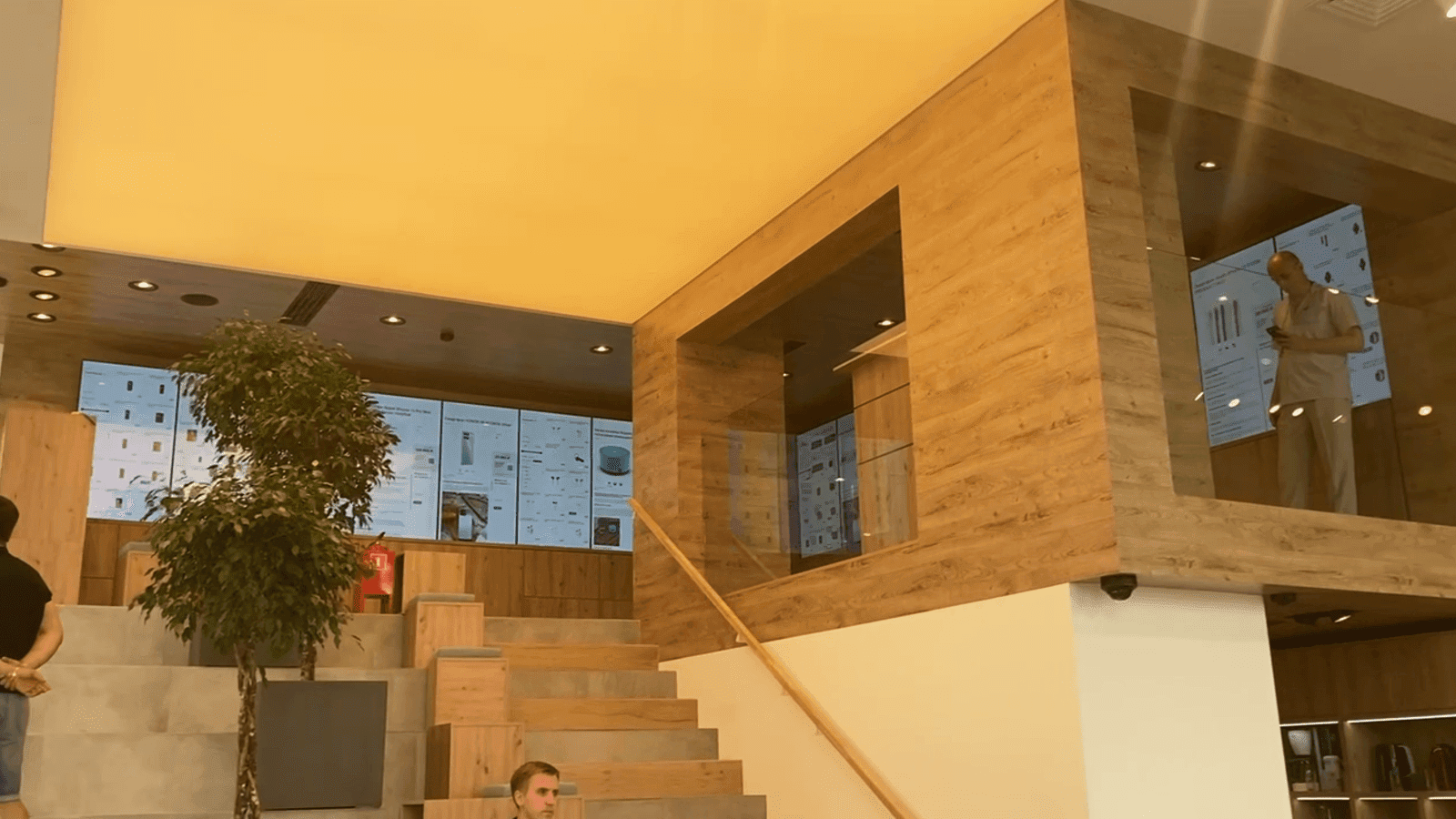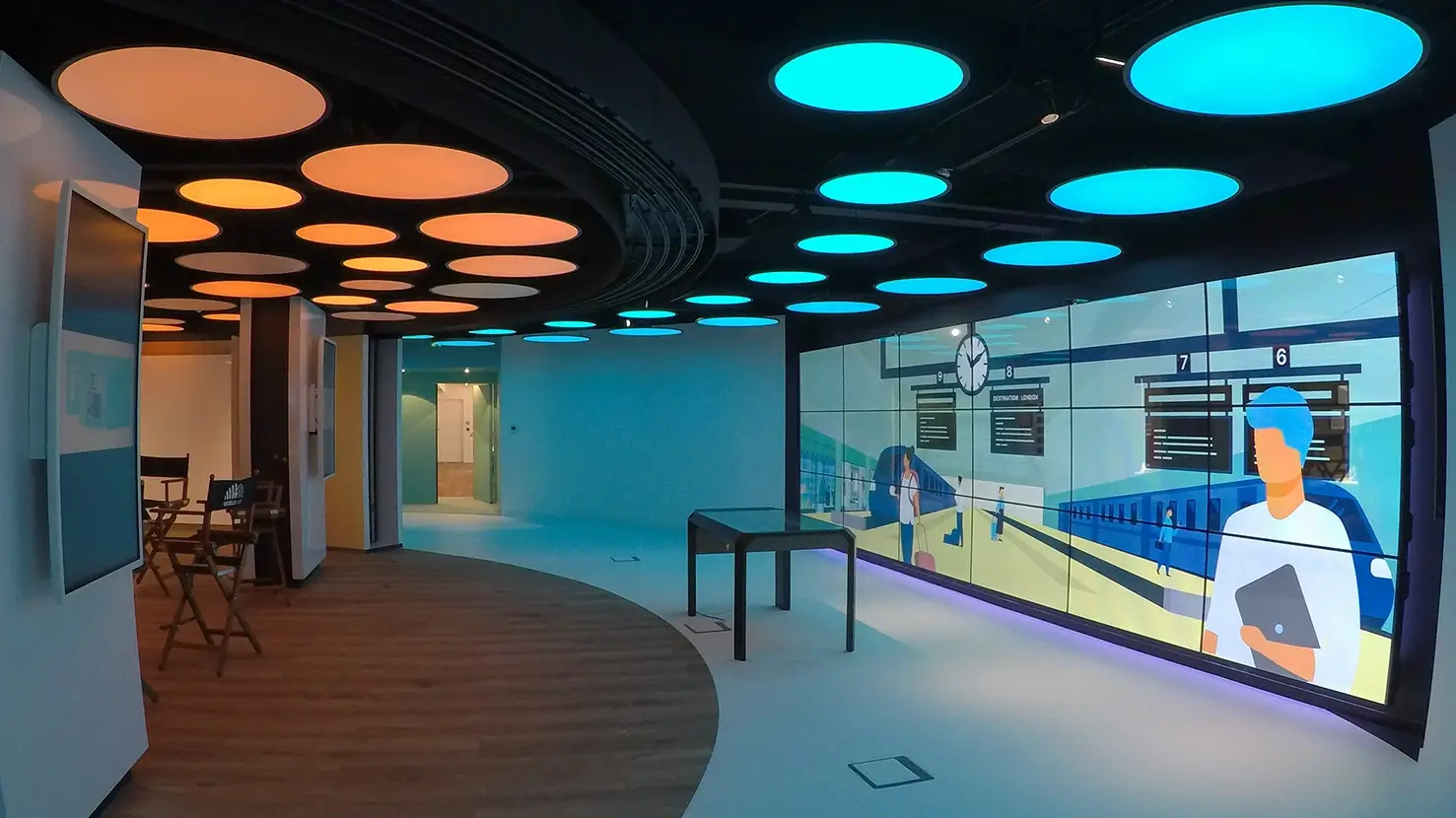INSIGHTS
The Rise of Interactive Video Walls: From Trend to Standard
DISPLAX Team | September 4, 2025 | 8min
Why interactive video walls are suddenly everywhere
Why interactive video walls are suddenly everywhere
Walk into a museum, a retail store, or even the lobby of a big corporate building, and chances are you’ll see something that wasn’t so common ten years ago: a wall that talks back to you.
Interactive video walls aren’t just big screens anymore, they’re turning into giant playgrounds for ideas, stories, and collaboration. They’re where brands show their soul, where teams brainstorm like never before, and where visitors get lost (in a good way) in content they can explore themselves.
And it’s not just a passing trend. The numbers are clear:
“The interactive video wall market is set to grow from USD 20.11 billion in 2025 to USD 34.31 billion by 2030. That’s an 11.3% CAGR.”
- Research and Markets, 2025
That’s not hype. That’s momentum.
Walk into a museum, a retail store, or even the lobby of a big corporate building, and chances are you’ll see something that wasn’t so common ten years ago: a wall that talks back to you.
Interactive video walls aren’t just big screens anymore, they’re turning into giant playgrounds for ideas, stories, and collaboration. They’re where brands show their soul, where teams brainstorm like never before, and where visitors get lost (in a good way) in content they can explore themselves.
And it’s not just a passing trend. The numbers are clear:
“The interactive video wall market is set to grow from USD 20.11 billion in 2025 to USD 34.31 billion by 2030. That’s an 11.3% CAGR.”
- Research and Markets, 2025
What’s driving this growth?
What’s driving this growth?
There’s no single reason, it’s a mix of tech maturing, audiences expecting more interactivity, and spaces becoming more flexible.
Here are the big drivers we’re seeing:
Retail & Experience Marketing
Stores aren’t just about shelves anymore, they’re stages. Interactive walls let shoppers dive into product lines, mix and match, or even play with content that turns shopping into entertainment.
Corporate Collaboration
Hybrid work needs big canvases. Companies are rethinking meeting rooms, showrooms, and lobbies, using interactive walls to brainstorm, present, or wow visitors the moment they step inside.
Culture & Education
Museums, galleries, and science centers have always wanted visitors to touch history. Now they can, literally, zooming into artifacts, exploring timelines, or interacting with digital exhibits.
High-Impact Spaces
Control rooms, airports, and public venues need huge amounts of information displayed clearly, and touched easily.
In short: interactivity is no longer optional, it’s expected.
There’s no single reason, it’s a mix of tech maturing, audiences expecting more interactivity, and spaces becoming more flexible.
Here are the big drivers we’re seeing:
Retail & Experience Marketing
Stores aren’t just about shelves anymore, they’re stages. Interactive walls let shoppers dive into product lines, mix and match, or even play with content that turns shopping into entertainment.Corporate Collaboration
Hybrid work needs big canvases. Companies are rethinking meeting rooms, showrooms, and lobbies, using interactive walls to brainstorm, present, or wow visitors the moment they step inside.Culture & Education
Museums, galleries, and science centers have always wanted visitors to touch history. Now they can, literally, zooming into artifacts, exploring timelines, or interacting with digital exhibits.High-Impact Spaces
Control rooms, airports, and public venues need huge amounts of information displayed clearly, and touched easily.
Why PCAP is winning the tech battle
Why PCAP is winning the tech battle
Why PCAP is winning the tech battle
Okay, quick tech detour. If you’re building an interactive wall, you have a few touch technologies to choose from. But in 2025, the market is clearly voting for one: PCAP (Projected Capacitive Touch).
Here’s why PCAP keeps winning:
Lighting is no problem: daylight, LED spotlights, or funky retail lighting setups don’t mess with it. Camera-based systems (like MultiTaction Decca) and Infrared can’t say the same.
Tough as nails: glass surface, scratch resistant, built for thousands of daily touches.
Super precise: smooth swipes, pinch-to-zoom, and multi-touch gestures that feel natural.
Looks great: no weird reflections, no lag, just crisp, clear visuals.
Or to put it simply: PCAP just works, everywhere.
Okay, quick tech detour. If you’re building an interactive wall, you have a few touch technologies to choose from. But in 2025, the market is clearly voting for one: PCAP (Projected Capacitive Touch).
Here’s why PCAP keeps winning:
Lighting is no problem: daylight, LED spotlights, or funky retail lighting setups don’t mess with it. Camera-based systems (like MultiTaction Decca) and Infrared can’t say the same.
Tough as nails: glass surface, scratch resistant, built for thousands of daily touches.
Super precise: smooth swipes, pinch-to-zoom, and multi-touch gestures that feel natural.
Looks great: no weird reflections, no lag, just crisp, clear visuals.
Real-world examples
Real-world examples
Real-world examples
Let’s bring this down to earth. Here are three places where interactive walls are killing it right now:
Let’s bring this down to earth. Here are three places where interactive walls are killing it right now:
Museums & Cultural Spaces
Museums & Cultural Spaces
Imagine walking up to a giant wall that shows the history of space travel. You touch 1969, and suddenly you’re looking at Apollo 11 launch videos, astronaut interviews, and 3D models of the lunar module.
That’s happening today. Museums use interactive walls to make learning immersive and fun, without needing a tour guide hovering over your shoulder.
Why PCAP works here: lighting conditions vary, people touch all day long, and content needs to be precise and engaging.
Imagine walking up to a giant wall that shows the history of space travel. You touch 1969, and suddenly you’re looking at Apollo 11 launch videos, astronaut interviews, and 3D models of the lunar module.
That’s happening today. Museums use interactive walls to make learning immersive and fun, without needing a tour guide hovering over your shoulder.
Why PCAP works here: lighting conditions vary, people touch all day long, and content needs to be precise and engaging.Retail & Showrooms
Retail & Showrooms
Ever been to a flagship store where you can swipe through an entire product catalog on a massive wall? That’s retail storytelling in action. Shoppers can see different models, compare options, even watch product demos in a way no brochure can deliver.
One of our retail clients put it best:
“Our interactive wall turned browsers into buyers. People spent more time in-store, and we saw a clear lift in engagement with our premium products.”
- Josip Horvát
Ever been to a flagship store where you can swipe through an entire product catalog on a massive wall? That’s retail storytelling in action. Shoppers can see different models, compare options, even watch product demos in a way no brochure can deliver.
One of our retail clients put it best:
“Our interactive wall turned browsers into buyers. People spent more time in-store, and we saw a clear lift in engagement with our premium products.”- Josip Horvát
Corporate Lobbies & Experience Centers
Corporate Lobbies & Experience Centers
This one’s booming. More and more companies are creating experience centers, dedicated spaces to show partners, clients, or even new hires what the company stands for. Interactive walls are front and center.
Think of a wall where visitors can touch a map of the world and see projects light up in real-time. Or swipe through the company’s innovation timeline. It’s powerful, and it makes a first impression that PowerPoint slides never could.
This one’s booming. More and more companies are creating experience centers, dedicated spaces to show partners, clients, or even new hires what the company stands for. Interactive walls are front and center.
Think of a wall where visitors can touch a map of the world and see projects light up in real-time. Or swipe through the company’s innovation timeline. It’s powerful, and it makes a first impression that PowerPoint slides never could.TILE & TILE Pro: Quietly setting the benchmark
TILE & TILE Pro: Quietly setting the benchmark
Now, I promised this wouldn’t be a sales pitch, and it’s not. But let me give you some context.
At DISPLAX, we’ve been working in PCAP touch for years, and our TILE and TILE Pro products have basically become the go-to reference for video walls in this space. Here’s why people pick them (without me going all “brochure” on you):
Plug & play: set them up side by side, connect them, and you’re live.
Any software you want: works with Windows, macOS, Linux… whatever you run.
Public space ready: reliable, slim, robust.
Daylight friendly: use them in a bright atrium or showroom, no problem.
That’s it. No gimmicks, no proprietary lock-in. Just tools that work.
Now, I promised this wouldn’t be a sales pitch, and it’s not. But let me give you some context.
At DISPLAX, we’ve been working in PCAP touch for years, and our TILE and TILE Pro products have basically become the go-to reference for video walls in this space. Here’s why people pick them (without me going all “brochure” on you):
Plug & play: set them up side by side, connect them, and you’re live.
Any software you want: works with Windows, macOS, Linux… whatever you run.
Public space ready: reliable, slim, robust.
Daylight friendly: use them in a bright atrium or showroom, no problem.
A quick look at the numbers
A quick look at the numbers
Sometimes, it’s easier to let the stats speak:
“The global interactive video wall market was valued at USD 18.33 billion in 2024, and is expected to grow at a CAGR of 14% between 2025 and 2030.”
- Grand View Research, 2025
“The broader interactive display market is set to reach USD 71.26 billion by 2030, up from 48.29 billion in 2025.”
- Mordor Intelligence, 2025
These numbers show that what used to be “experimental” is now mainstream. If you’re in AV, retail design, or corporate space planning, interactive walls aren’t futuristic, they’re table stakes.
Sometimes, it’s easier to let the stats speak:
“The global interactive video wall market was valued at USD 18.33 billion in 2024, and is expected to grow at a CAGR of 14% between 2025 and 2030.”
- Grand View Research, 2025
“The broader interactive display market is set to reach USD 71.26 billion by 2030, up from 48.29 billion in 2025.”
- Mordor Intelligence, 2025
Wrapping it up
Wrapping it up
Interactive video walls are no longer rare sightings, they’re becoming the standard way we interact with content in shared spaces.
And PCAP is the technology making it happen. Reliable, robust, and future-proof.
For us at DISPLAX, TILE and TILE Pro are part of that story, but the bigger picture is this: interactive walls are changing the way people experience brands, culture, and collaboration.
And honestly? That’s what makes this industry so exciting!
Interactive video walls are no longer rare sightings, they’re becoming the standard way we interact with content in shared spaces.
And PCAP is the technology making it happen. Reliable, robust, and future-proof.
For us at DISPLAX, TILE and TILE Pro are part of that story, but the bigger picture is this: interactive walls are changing the way people experience brands, culture, and collaboration.
And honestly? That’s what makes this industry so exciting! If you’re planning spaces for the next five years, plan for interactive walls. They’re not just “nice to have” anymore, they’re expected.
If you’re planning spaces for the next five years, plan for interactive walls. They’re not just “nice to have” anymore, they’re expected.
Want help choosing the right PCAP solution for your project?
Want help choosing the right PCAP solution for your project?
Get in touch with the DISPLAX team for a sample, consultation, or product spec comparison.
Get in touch with the DISPLAX team for a sample, consultation, or product spec comparison.
INSIGHTS
The Rise of Interactive Video Walls: From Trend to Standard
DISPLAX Team | September 4, 2025 | 8min
Why interactive video walls are suddenly everywhere
Why interactive video walls are suddenly everywhere
Walk into a museum, a retail store, or even the lobby of a big corporate building, and chances are you’ll see something that wasn’t so common ten years ago: a wall that talks back to you.
Interactive video walls aren’t just big screens anymore, they’re turning into giant playgrounds for ideas, stories, and collaboration. They’re where brands show their soul, where teams brainstorm like never before, and where visitors get lost (in a good way) in content they can explore themselves.
And it’s not just a passing trend. The numbers are clear:
“The interactive video wall market is set to grow from USD 20.11 billion in 2025 to USD 34.31 billion by 2030. That’s an 11.3% CAGR.”
- Research and Markets, 2025
That’s not hype. That’s momentum.
Walk into a museum, a retail store, or even the lobby of a big corporate building, and chances are you’ll see something that wasn’t so common ten years ago: a wall that talks back to you.
Interactive video walls aren’t just big screens anymore, they’re turning into giant playgrounds for ideas, stories, and collaboration. They’re where brands show their soul, where teams brainstorm like never before, and where visitors get lost (in a good way) in content they can explore themselves.
And it’s not just a passing trend. The numbers are clear:
“The interactive video wall market is set to grow from USD 20.11 billion in 2025 to USD 34.31 billion by 2030. That’s an 11.3% CAGR.”
- Research and Markets, 2025
What’s driving this growth?
What’s driving this growth?
There’s no single reason, it’s a mix of tech maturing, audiences expecting more interactivity, and spaces becoming more flexible.
Here are the big drivers we’re seeing:
Retail & Experience Marketing
Stores aren’t just about shelves anymore, they’re stages. Interactive walls let shoppers dive into product lines, mix and match, or even play with content that turns shopping into entertainment.
Corporate Collaboration
Hybrid work needs big canvases. Companies are rethinking meeting rooms, showrooms, and lobbies, using interactive walls to brainstorm, present, or wow visitors the moment they step inside.
Culture & Education
Museums, galleries, and science centers have always wanted visitors to touch history. Now they can, literally, zooming into artifacts, exploring timelines, or interacting with digital exhibits.
High-Impact Spaces
Control rooms, airports, and public venues need huge amounts of information displayed clearly, and touched easily.
In short: interactivity is no longer optional, it’s expected.
There’s no single reason, it’s a mix of tech maturing, audiences expecting more interactivity, and spaces becoming more flexible.
Here are the big drivers we’re seeing:
Retail & Experience Marketing
Stores aren’t just about shelves anymore, they’re stages. Interactive walls let shoppers dive into product lines, mix and match, or even play with content that turns shopping into entertainment.Corporate Collaboration
Hybrid work needs big canvases. Companies are rethinking meeting rooms, showrooms, and lobbies, using interactive walls to brainstorm, present, or wow visitors the moment they step inside.Culture & Education
Museums, galleries, and science centers have always wanted visitors to touch history. Now they can, literally, zooming into artifacts, exploring timelines, or interacting with digital exhibits.High-Impact Spaces
Control rooms, airports, and public venues need huge amounts of information displayed clearly, and touched easily.
Why PCAP is winning the tech battle
Why PCAP is winning the tech battle
Why PCAP is winning the tech battle
Okay, quick tech detour. If you’re building an interactive wall, you have a few touch technologies to choose from. But in 2025, the market is clearly voting for one: PCAP (Projected Capacitive Touch).
Here’s why PCAP keeps winning:
Lighting is no problem: daylight, LED spotlights, or funky retail lighting setups don’t mess with it. Camera-based systems (like MultiTaction Decca) and Infrared can’t say the same.
Tough as nails: glass surface, scratch resistant, built for thousands of daily touches.
Super precise: smooth swipes, pinch-to-zoom, and multi-touch gestures that feel natural.
Looks great: no weird reflections, no lag, just crisp, clear visuals.
Or to put it simply: PCAP just works, everywhere.
Okay, quick tech detour. If you’re building an interactive wall, you have a few touch technologies to choose from. But in 2025, the market is clearly voting for one: PCAP (Projected Capacitive Touch).
Here’s why PCAP keeps winning:
Lighting is no problem: daylight, LED spotlights, or funky retail lighting setups don’t mess with it. Camera-based systems (like MultiTaction Decca) and Infrared can’t say the same.
Tough as nails: glass surface, scratch resistant, built for thousands of daily touches.
Super precise: smooth swipes, pinch-to-zoom, and multi-touch gestures that feel natural.
Looks great: no weird reflections, no lag, just crisp, clear visuals.
Real-world examples
Real-world examples
Real-world examples
Let’s bring this down to earth. Here are three places where interactive walls are killing it right now:
Let’s bring this down to earth. Here are three places where interactive walls are killing it right now:
Museums & Cultural Spaces
Museums & Cultural Spaces
Imagine walking up to a giant wall that shows the history of space travel. You touch 1969, and suddenly you’re looking at Apollo 11 launch videos, astronaut interviews, and 3D models of the lunar module.
That’s happening today. Museums use interactive walls to make learning immersive and fun, without needing a tour guide hovering over your shoulder.
Why PCAP works here: lighting conditions vary, people touch all day long, and content needs to be precise and engaging.
Imagine walking up to a giant wall that shows the history of space travel. You touch 1969, and suddenly you’re looking at Apollo 11 launch videos, astronaut interviews, and 3D models of the lunar module.
That’s happening today. Museums use interactive walls to make learning immersive and fun, without needing a tour guide hovering over your shoulder.
Why PCAP works here: lighting conditions vary, people touch all day long, and content needs to be precise and engaging.Retail & Showrooms
Retail & Showrooms
Ever been to a flagship store where you can swipe through an entire product catalog on a massive wall? That’s retail storytelling in action. Shoppers can see different models, compare options, even watch product demos in a way no brochure can deliver.
One of our retail clients put it best:
“Our interactive wall turned browsers into buyers. People spent more time in-store, and we saw a clear lift in engagement with our premium products.”
- Josip Horvát
Ever been to a flagship store where you can swipe through an entire product catalog on a massive wall? That’s retail storytelling in action. Shoppers can see different models, compare options, even watch product demos in a way no brochure can deliver.
One of our retail clients put it best:
“Our interactive wall turned browsers into buyers. People spent more time in-store, and we saw a clear lift in engagement with our premium products.”- Josip Horvát
Corporate Lobbies & Experience Centers
Corporate Lobbies & Experience Centers
This one’s booming. More and more companies are creating experience centers, dedicated spaces to show partners, clients, or even new hires what the company stands for. Interactive walls are front and center.
Think of a wall where visitors can touch a map of the world and see projects light up in real-time. Or swipe through the company’s innovation timeline. It’s powerful, and it makes a first impression that PowerPoint slides never could.
This one’s booming. More and more companies are creating experience centers, dedicated spaces to show partners, clients, or even new hires what the company stands for. Interactive walls are front and center.
Think of a wall where visitors can touch a map of the world and see projects light up in real-time. Or swipe through the company’s innovation timeline. It’s powerful, and it makes a first impression that PowerPoint slides never could.TILE & TILE Pro: Quietly setting the benchmark
TILE & TILE Pro: Quietly setting the benchmark
Now, I promised this wouldn’t be a sales pitch, and it’s not. But let me give you some context.
At DISPLAX, we’ve been working in PCAP touch for years, and our TILE and TILE Pro products have basically become the go-to reference for video walls in this space. Here’s why people pick them (without me going all “brochure” on you):
Plug & play: set them up side by side, connect them, and you’re live.
Any software you want: works with Windows, macOS, Linux… whatever you run.
Public space ready: reliable, slim, robust.
Daylight friendly: use them in a bright atrium or showroom, no problem.
That’s it. No gimmicks, no proprietary lock-in. Just tools that work.
Now, I promised this wouldn’t be a sales pitch, and it’s not. But let me give you some context.
At DISPLAX, we’ve been working in PCAP touch for years, and our TILE and TILE Pro products have basically become the go-to reference for video walls in this space. Here’s why people pick them (without me going all “brochure” on you):
Plug & play: set them up side by side, connect them, and you’re live.
Any software you want: works with Windows, macOS, Linux… whatever you run.
Public space ready: reliable, slim, robust.
Daylight friendly: use them in a bright atrium or showroom, no problem.
A quick look at the numbers
A quick look at the numbers
Sometimes, it’s easier to let the stats speak:
“The global interactive video wall market was valued at USD 18.33 billion in 2024, and is expected to grow at a CAGR of 14% between 2025 and 2030.”
- Grand View Research, 2025
“The broader interactive display market is set to reach USD 71.26 billion by 2030, up from 48.29 billion in 2025.”
- Mordor Intelligence, 2025
These numbers show that what used to be “experimental” is now mainstream. If you’re in AV, retail design, or corporate space planning, interactive walls aren’t futuristic, they’re table stakes.
Sometimes, it’s easier to let the stats speak:
“The global interactive video wall market was valued at USD 18.33 billion in 2024, and is expected to grow at a CAGR of 14% between 2025 and 2030.”
- Grand View Research, 2025
“The broader interactive display market is set to reach USD 71.26 billion by 2030, up from 48.29 billion in 2025.”
- Mordor Intelligence, 2025
Wrapping it up
Wrapping it up
Interactive video walls are no longer rare sightings, they’re becoming the standard way we interact with content in shared spaces.
And PCAP is the technology making it happen. Reliable, robust, and future-proof.
For us at DISPLAX, TILE and TILE Pro are part of that story, but the bigger picture is this: interactive walls are changing the way people experience brands, culture, and collaboration.
And honestly? That’s what makes this industry so exciting!
Interactive video walls are no longer rare sightings, they’re becoming the standard way we interact with content in shared spaces.
And PCAP is the technology making it happen. Reliable, robust, and future-proof.
For us at DISPLAX, TILE and TILE Pro are part of that story, but the bigger picture is this: interactive walls are changing the way people experience brands, culture, and collaboration.
And honestly? That’s what makes this industry so exciting! If you’re planning spaces for the next five years, plan for interactive walls. They’re not just “nice to have” anymore, they’re expected.
If you’re planning spaces for the next five years, plan for interactive walls. They’re not just “nice to have” anymore, they’re expected.
Want help choosing the right PCAP solution for your project?
Want help choosing the right PCAP solution for your project?
Get in touch with the DISPLAX team for a sample, consultation, or product spec comparison.
Get in touch with the DISPLAX team for a sample, consultation, or product spec comparison.

















